MercoPress. South Atlantic News Agency
Tag: Climate change
-
Friday, September 25th 2020 - 09:20 UTC
If Covid-19 is addressed with the same disunity and disarray as climate change, “I fear the worst”, warns UN head

The United States, China and Russia fought on Thursday during a United Nations Security Council meeting on the coronavirus pandemic after UN chief Antonio Guterres had warned the body that if the climate crisis was approached with the “same disunity and disarray” of COVID-19, then: “I fear the worst.”
-
Monday, September 21st 2020 - 08:27 UTC
Group of world's largest corporations call to support nature and fight climate change
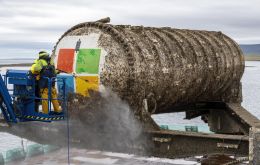
Some of the world's biggest companies on Monday backed growing calls for governments to do more to reverse the accelerating destruction of the natural world and support broader efforts to fight climate change.
-
Tuesday, September 15th 2020 - 09:50 UTC
Huge calving at the Arctic ice shelf: the massive chunk is larger than Paris

A massive chunk of ice - larger than the city of Paris - has broken off from the Arctic's largest ice shelf because of warmer temperatures in Greenland, scientists said on Monday. The 113 sq km block broke off the Nioghalvfjerdsfjorden glacier in Northeast Greenland, which the scientists said had been expected given the rising average temperatures.
-
Tuesday, September 15th 2020 - 09:10 UTC
Trump denies climate change in California; Biden called him a “climate arsonist”

President Donald Trump on Monday suggested global warming will reverse itself and dismissed climate change as a cause of ferocious fires engulfing swaths of the US West, during a briefing in California on the deadly blazes.
-
Saturday, September 12th 2020 - 09:56 UTC
Falklands presents “State of Environment 2020” report
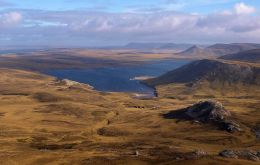
The Falkland Islands Government has released of the ‘State of Environment 2020’ report. The publication combines environmental facts and figures to provide a summary of the overall state of the Falkland Islands' natural environment towards the end of 2019.
-
Wednesday, September 2nd 2020 - 08:15 UTC
Pope Francis urges nations to fight global warming: “creation is groaning”

Pope Francis on Tuesday urged nations to fight global warming according to the 2015 Paris climate accord, weighing in on issues that figure in the US presidential race. Modern society had pushed the planet beyond its limits and the time to fix a climate emergency was running out, he said.
-
Tuesday, August 25th 2020 - 09:29 UTC
Why the pandemic’s pause on travel could be a defining moment for rethinking Antarctic tourism
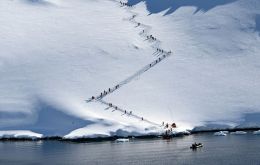
By Eilís Quinn, Eye on the Arctic (*) – The current pause on international travel could be an important moment for the international community to rethink the future development of Antarctic tourism, says an expert on the region.
-
Friday, August 21st 2020 - 09:49 UTC
Earth Overshoot Day will be reached next Saturday, according to Global Footprint Network scientists
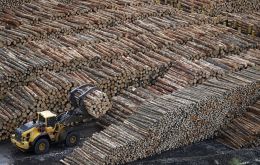
Humanity will have burned through all the natural resources that the planet can replenish for 2020 by Saturday Aug 22, according to researchers who said the grim milestone is slightly later than last year after the pandemic slowed runaway overconsumption.
-
Wednesday, August 19th 2020 - 09:19 UTC
Some 21 million tons of micro plastic floating in the Atlantic ocean

There are 12-21 million tons of tiny plastic fragments floating in the Atlantic Ocean, scientists have found. A study, led by the UK's National Oceanography Centre, scooped through layers of the upper 200m of the ocean during a research expedition through the middle of the Atlantic.
-
Tuesday, August 18th 2020 - 08:33 UTC
Hottest temperature in at least a century on Sunday in Death Valley, Mojave Desert
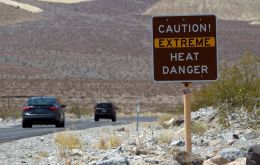
One of the hottest air temperatures recorded anywhere on the planet in at least a century, and possibly ever, was reached on Sunday afternoon at Death Valley in California’s Mojave Desert where it soared to 130 Fahrenheit (54.4 Celsius).
